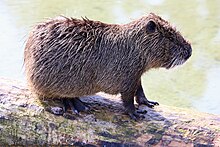Myocastorini is a tribe of echimyid rodents, proposed in 2017, and containing the five extant genera Callistomys, Hoplomys, Myocastor, Proechimys, and Thrichomys.[1]
| Myocastorini | |
|---|---|

| |
| Nutria (Myocastor coypus) | |
| Scientific classification | |
| Domain: | Eukaryota |
| Kingdom: | Animalia |
| Phylum: | Chordata |
| Class: | Mammalia |
| Order: | Rodentia |
| Family: | Echimyidae |
| Subfamily: | Echimyinae |
| Tribe: | Myocastorini Fabre et al. 2017 [1] |
| Genera | |
Definition
editMyocastorini members share long upper incisor roots (except Callistomys), and mid- to long-sized lower incisor roots. These five genera share either four (Callistomys, Thrichomys) or five (Hoplomys, Myocastor, Proechimys) lophids on the lower deciduous fourth premolar, three roots anchoring the upper molars, and well-connected lophs on cheek teeth.[1]
Members display a variety of lifestyles including terrestrial (Hoplomys, Proechimys, Thrichomys), arboreal (Callistomys), and amphibious (Myocastor) adaptations.
Phylogeny
editOn the one hand, the genus Proechimys is the sister group to the genus Hoplomys (armored rats), and both form a clade of lowland rainforest terrestrial spiny rats. On the other hand, Callistomys (painted tree-rats) is the sister group to Myocastor (coypus). In turn, these two pairs of genera share evolutionary affinities with Thrichomys (punaré).
| Genus-level cladogram of the Myocastorini. |
| The cladogram has been reconstructed from mitochondrial and nuclear DNA characters.[2][3][4][5][6][7][8][1] |
References
edit- ^ a b c d Fabre, Pierre-Henri; Upham, Nathan S.; Emmons, Louise H.; Justy, Fabienne; Leite, Yuri L. R.; Loss, Ana Carolina; Orlando, Ludovic; Tilak, Marie-Ka; Patterson, Bruce D.; Douzery, Emmanuel J. P. (2017-03-01). "Mitogenomic Phylogeny, Diversification, and Biogeography of South American Spiny Rats". Molecular Biology and Evolution. 34 (3): 613–633. doi:10.1093/molbev/msw261. ISSN 0737-4038. PMID 28025278.
- ^ Galewski, Thomas; Mauffrey, Jean-François; Leite, Yuri L. R.; Patton, James L.; Douzery, Emmanuel J. P. (2005). "Ecomorphological diversification among South American spiny rats (Rodentia; Echimyidae): a phylogenetic and chronological approach". Molecular Phylogenetics and Evolution. 34 (3): 601–615. doi:10.1016/j.ympev.2004.11.015. PMID 15683932.
- ^ Upham, Nathan S.; Patterson, Bruce D. (2012). "Diversification and biogeography of the Neotropical caviomorph lineage Octodontoidea (Rodentia: Hystricognathi)". Molecular Phylogenetics and Evolution. 63 (2): 417–429. doi:10.1016/j.ympev.2012.01.020. PMID 22327013.
- ^ Fabre, Pierre-Henri; Galewski, Thomas; Tilak, Marie-ka; Douzery, Emmanuel J. P. (2013-03-01). "Diversification of South American spiny rats (Echimyidae): a multigene phylogenetic approach". Zoologica Scripta. 42 (2): 117–134. doi:10.1111/j.1463-6409.2012.00572.x. ISSN 1463-6409. S2CID 83639441.
- ^ Loss, Ana; Moura, Raquel T.; Leite, Yuri L. R. (2014). "Unexpected phylogenetic relationships of the painted tree rat Callistomys pictus (Rodentia: Echimyidae)" (PDF). Natureza on Line. 12: 132–136.
- ^ Fabre, Pierre-Henri; Vilstrup, Julia T.; Raghavan, Maanasa; Der Sarkissian, Clio; Willerslev, Eske; Douzery, Emmanuel J. P.; Orlando, Ludovic (2014-07-01). "Rodents of the Caribbean: origin and diversification of hutias unravelled by next-generation museomics". Biology Letters. 10 (7): 20140266. doi:10.1098/rsbl.2014.0266. ISSN 1744-9561. PMC 4126619. PMID 25115033.
- ^ Upham, Nathan S.; Patterson, Bruce D. (2015). "Evolution of Caviomorph rodents: a complete phylogeny and timetree for living genera". In Vassallo, Aldo Ivan; Antenucci, Daniel (eds.). Biology of caviomorph rodents: diversity and evolution. Buenos Aires: SAREM Series A, Mammalogical Research — Sociedad Argentina para el Estudio de los Mamíferos. pp. 63–120.
- ^ Fabre, Pierre-Henri; Patton, James L.; Leite, Yuri L. R. (2016). "Family Echimyidae (hutias, South American spiny-rats and coypu)". In Wilson, Don E.; Lacher, Thomas E. Jr; Mittermeier, Russell A. (eds.). Handbook of the Mammals of the World. Vol 6. Lagomorphs and Rodents I. Barcelona: Lynx Edicions. pp. 552–641. ISBN 978-84-941892-3-4.